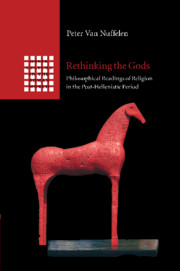Book contents
- Frontmatter
- Contents
- Acknowledgements
- Abbreviations
- Introduction
- Part I Ancient wisdom
- Part II Cosmic hierarchy
- Part III Polemic and prejudice: challenging the discourse
- Chapter 9 Lucian, Epicureanism and strategies of satire
- Chapter 10 Philo of Alexandria
- Chapter 11 Celsus and Christian superstition
- Epilogue
- Bibliography
- Index
Chapter 11 - Celsus and Christian superstition
from Part III - Polemic and prejudice: challenging the discourse
Published online by Cambridge University Press: 05 December 2011
- Frontmatter
- Contents
- Acknowledgements
- Abbreviations
- Introduction
- Part I Ancient wisdom
- Part II Cosmic hierarchy
- Part III Polemic and prejudice: challenging the discourse
- Chapter 9 Lucian, Epicureanism and strategies of satire
- Chapter 10 Philo of Alexandria
- Chapter 11 Celsus and Christian superstition
- Epilogue
- Bibliography
- Index
Summary
Christianity did not arise in a vacuum: its doctrine and its way of arguing developed in close engagement with the surrounding Graeco-Roman culture and its Jewish roots. When the pagan Platonist Celsus set out to criticise Christianity in his True Discourse (Alēthēs logos) at the end of the second century, he encountered a religion that justified itself in terms very similar to how he and his fellow philosophers approached Graeco-Roman religion, especially regarding the two themes to which this book has drawn attention: antiquity as a source of wisdom and the view of the cosmos as a well-structured hierarchy. Both were used by Christians to justify their own beliefs and acquire authority for it, but at the same time pagan authors would draw on them to exclude Christianity from the community of reason formed by Graeco-Roman culture.
Christians were only too well aware of the fact that their religion was relatively young. They could not present their own religion as ancient by itself and thus argued for the high antiquity of Hebrew culture, of which Christianity was supposed to represent not a breakaway sect but a renewal of the original tradition. In a polemical countermove that we have already encountered in Philo of Alexandria, Graeco-Roman philosophical tradition was made dependent on Moses. The importance of such arguments for Christian culture cannot be overestimated: it spurred, for example, Christian interest in chronicle writing, which could be used to prove that Hebrew culture was older and therefore superior to its Graeco-Roman counterpart. Also, G. Boys-Stones has argued that the Christian definition of ‘orthodoxy’ can be understood as a reply to pagan criticism that Christianity could not represent the truth because it was so divided. This forced Christian authors and apologists to isolate ‘heresies’ as deviations from the authoritative tradition and contrast them with orthodoxy – in much the same way as Numenius argued that his own form of Platonism was the original and thus the authoritative one. Such arguments acquired their most elaborate form in the fourth century, when Eusebius of Caesarea contrasted the original Hebrews who possessed truth and wisdom to the later Jews who had degenerated and lost that truth. He presented Christianity essentially as a return to that original Hebrew doctrine. Unsurprisingly, he also set Christian chronicle writing on an entirely new footing.
- Type
- Chapter
- Information
- Rethinking the GodsPhilosophical Readings of Religion in the Post-Hellenistic Period, pp. 217 - 230Publisher: Cambridge University PressPrint publication year: 2011

